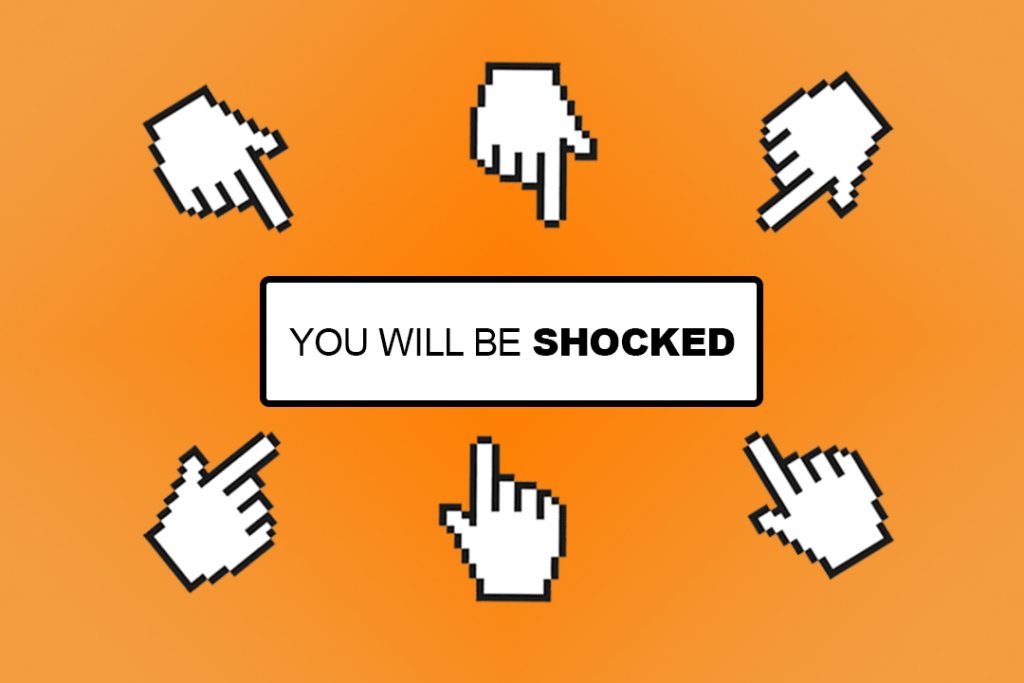I think it was around 2014 when the internet truly started freaking out about "clickbait." As with anything that people feel free to be righteously but non-controversially outraged about, some people took it a little too far. Soon, it didn't just describe headlines or images promising exciting information you couldn't get to without clicking through 80,000 slides (and sometimes never got to), or headlines that promised "and what happened will shock you!" and were then not particularly shocking, but practically any headline that did not give away everything that was pertinent to know in the article itself.
Being that I wrote on the internet for a living, it was a criticism I was particularly tuned in to. I'm not gonna lie — it absolutely annoyed the shit out of me. It was right up there with people commenting "Why don't you just give us the facts and let us make up our own minds!" on op-eds or the ever-present "Who?" or "And I should care why?" I'd see comments like "Oh I see what they're doing! They just want to get us to click so we'll read the entire article!" and I would get so mad. For one, if headlines contained all the information one needed to know on a subject, they would be ridiculously long. For another, it was just weird to see people complaining on social media that I — or anyone else — was trying to "manipulate" them into reading the whole article and giving away one of their precious clicks, as if they were giving away a piece of their soul rather than simply opening a new tab in their browser.
I sometimes tried to make people understand that sometimes websites had to publish some fluff — pictures of cute animals, celebrity gossip, whatever — in order to be able to fund the good stuff they wanted to do. Because, back then, clicks were how advertisers determined how much money to give you. They were not usually interested. People don't like to know how their sausage is made.
I was so personally annoyed by all of this that I didn't really think about it in terms of anything other than how it affected me and the industry I was in. But I really should have taken it more seriously. We all should have.
People were not kidding when they said they only wanted to read headlines.
Sure, for some people, they were feeling overly vigilant about being emotionally manipulated by online media, but other people legitimately did just want to read headlines and be able feel like a relatively well-informed person after doing so. They did not want to have to click through for the whole story, and there were a lot of nefarious actors out there who ended up taking advantage of that tendency.
This occurred to me yesterday while listening to the latest episode of the "You're Wrong About" podcast, "Losing Relatives To Fox News." A lot of the way people get inured to disinformation is by casually reading headlines on social media, on articles they don't even end up reading. They're just looking at the headlines and they're not necessarily thinking critically about them.
One of the biggest social problems in the last few years has been the spread of conspiracies and disinformation, a very large amount of which is spread on social media. The rise of the QAnonsense, obviously, but also bad information about COVID-19, the presidential election, vaccines, child sex trafficking, etc. These are exactly the kinds of made up things it is possible to feel fully informed on without actually reading much into it. It's the kind of disinformation that can easily be spread without anyone ever clicking through. In fact, if they did, they'd probably figure out that it's bullshit.
The thing about the clickbait outrage is that it framed not reading the whole article as an act of moral rectitude, as something that made a person not a fool or a contributor to the scourge of clickbait. People would brag in comment sections on social media about not giving sites "clicks" to punish them for headlines they didn't like (although ironically, the more people comment and interact with a Facebook post, the more people Facebook will show it to people, so it likely had the opposite of the effect they intended). Without that framing, the social stigma of commenting on an article without reading it might have remained a lot stronger. With it, people could get away with being simultaneously lazy and self-righteous — dangerous qualities for a consumer of information.
You still see people openly congratulating themselves on not giving websites "clicks" — even though that is no longer how most sites make money. Most sites (not Wonkette!) either have paywalls now or a whole lot of advertiser sponsored content. That's how they make money.
There has, of course, been a lot of talk about how to frame headlines so that the wrong information doesn't stick with people — particularly as it concerns fact-checking articles not posing false information as possibly true. But as much as we try and adjust ourselves and be aware of what we share online, it's hard to account for all of the other people sharing actual nonsense everywhere else. I'm not sure what we can really do to combat this now except to be aware of it and to do our best to make it more embarrassing to comment or share an article without reading it than morally upright to loudly announce to one and all that they didn't.
Do your Amazon shopping through this link, because reasons.
Wonkette does not make money from you clicking on our articles! We make money by you donating to us, and yet we remain free for all to read. We are basically a unicorn. So click below to donate or subscribe.

No comments:
Post a Comment